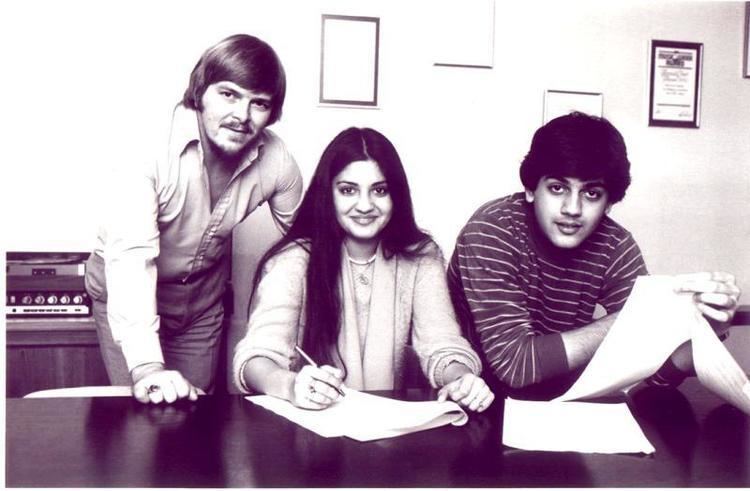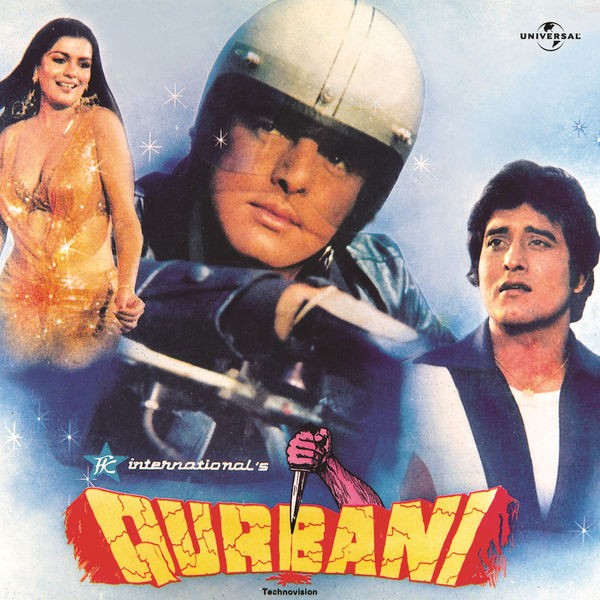Nazia Hassan’s professional music career began at age 10; Nazia Hassan met film director Feroz Khan in a celebration in the UK, who later asked that she audition with Biddu, a London-based Indian music composer, for his movie Qurbani.
Biddu subsequently signed her up for”Aap Jaisa Koi”, a tune he wrote for the movie. The song turned into be a massive victory in India, also Nazia Hassan quickly gained fame and acclaim.In 1981, Nazia won the Filmfare Award for Best Female Playback for its tune, getting the youngest to succeed at age 15 and being the first Pakistani to win the award.
She received praise for one, and won the Filmfare Award for Best Female Playback Singer in age 15 in 1981, becoming the first Pakistani to triumph and now remains the youngest recipient of this award thus far.

Nazia Hassan debut record, Disco Deewane, premiered in 1981, also charted in two states worldwide and became the most bestselling Asian pop album up in the moment. The record contained the English language only”Dreamer Deewane” that led her to become the first Pakistani singer to make it to the British charts.
Nazia Hassan promptly collaborated with Biddu on many different endeavors; in 1981, she became the primary playback singer to launch a record. Her first record was Disco Deewane. The record turned into a mega-hit and Nazia became a recognized pop singer in Pakistan; the record also featured vocals by her brother Zohaib Hassan.
Nazia and Zoheb were signed by EMI Group and were the very first South Asian celebrities to be signed up by an global music company. In the peak of Disco Deewane fever, she often attracted large audiences, such as 50,000 to 100,000 people greeting her in Calcutta Airport.
Called the”Queen of Pop” in South Asia,she started her music career at age 10, and proceeded to become one of the most prominent singers around South and Southeast Asia. Nazia’s next record, Young Tarang, premiered in 1984. This was the first record in Pakistan to incorporate music videos, which have been created in London by David Rose and Kathy Rose.

The album became among the very popular in Asia. “Ankhien Milane Wale” was a favorite song from the record. Following the launch of Young Tarang, she returned into singing for Bollywood films as a playback singer. Her fourth album, Hotline premiered in 1987. Aa Haan has been the very popular song of this record. Back in 1988, she and her brother Zohaib appeared with songs maestro Sohail Rana within his tv program, Sung Sung.
Following the launch of Disco Deewane, Biddu provided Zoheb and also her an opportunity to act in the film Star in 1982, but they refused and instead decided to execute the soundtrack. She had been nominated for the Filmfare Award for Best Female Playback Singer, but this time she didn’t win.

The record was powerful and improved the prevalence of Nazia and Zohaib in Pakistan and India. Back in 1991, Nazia along with her brother Zohaib listed her fifth record, Camera. Prior to the album’s release, she and Zohaib declared it could be their final record. The record has been released in 1992.
Following the record’s release, she abandoned her singing career to concentrate on her private life. Biddu wrote a tune,”Made in India” and he desired Nazia to sing it. However, the retired Nazia denied to sing a tune which may violate Pakistan.The tune was subsequently supplied to Alisha Chinai.

After the launch of Disco Deewane, Biddu provided Zoheb and her a chance to act in the film Star in 1982, but they refused and instead chose to perform the soundtrack. She was nominated for the Filmfare Award for Best Female Playback Singer, but this time she did not win. The record was powerful and increased the prevalence of Nazia and Zohaib in Pakistan and India.
Must Read: Mahira Khan diagnosed with Corona Virus, urges fans to wear masks
Nazia’s third album, Young Tarang, was released in 1984. It was the first album in Pakistan to incorporate music videos, which were made in London by David Rose and Kathy Rose. The album became among the most popular in Asia. “Ankhien Milane Wale” was a favorite song from the record. After the launch of Young Tarang, she returned into singing for Bollywood movies as a playback singer. Her fourth album, Hotline premiered in 1987. Aa Haan was the most popular song of this album. Back in 1988, she and her brother Zohaib appeared with songs maestro Sohail Rana in his tv program, Sung Sung.
In 1991, She along with her brother Zohaib recorded her fifth album, Camera Camera. Before the album’s release, she and Zohaib announced it would be their final record. The album was released in 1992. After the record’s release, she left her singing career to focus on her private life. Biddu wrote a song,”Made in India” and he wanted Nazia to sing it. But the retired she denied to sing a song that might violate Pakistan. The tune was subsequently offered to Alisha Chinai.

Nazia Hassan followed up with the records Boom Boom in 1982, a part of that was utilized as the soundtrack of the film Star (1982), Young Tarang in 1984 and Hotline in 1987. Her last record, Camera Camera in 1992, was part of a campaign against drugs. In 1988 she looked in Sung Sung with music maestro Sohail Rana. They also hosted the initial pop-music phase show, Music’89, made by Shoaib Mansoor. Her achievement played an essential role in shaping Pakistani pop music scene. Nazia made her singing debut with the song”Aap Jaisa Koi”, which appeared in the Indian film Qurbani at 1980.

She received praise for the single, and won the Filmfare Award for Best Female Playback Singer at the age of 15 in 1981, becoming the first Pakistani to triumph and currently remains the youngest recipient of this award thus far. Her debut album, Disco Deewane, was released in 1981, and charted in fourteen countries worldwide and became the most best-selling Asian pop record up at the time. The record included the English language single”Dreamer Deewane” which led her to become the first Pakistani singer to make it to the British charts.

Referred to as the”Queen of Pop” in South Asia,she started her music career at age 10, and went on to become one of the most prominent singers around South and Southeast Asia. In 1989, she and Zohaib hosted the show Music’89. The show was produced by Shoaib Mansoor. It was the most pop-music stage show to be aired on television. The show launched the careers of many new climbing leaders and bands and became so popular in Pakistan. She hosted another show, Dhanak on PTV in precisely the same year. She promptly collaborated with Biddu on many different projects; in 1981, she became the primary playback singer to release an album. Her first album was Disco Deewane.
Throughout her singing career spanning over 15 years, Hassan became one of Pakistan’s most popular celebrities. She had been a recipient of Pakistan’s civilian award, Pride of Performance. In addition to singing, she engaged in philanthropic activities, and was appointed by UNICEF as its cultural ambassador in 1991. She has been demonstrated to have dealt with differdent issues in her private life, such as depression. On August 13, 2000, She died of lung cancer in London at age 35.

Awards and Honours
Nazia Hassan received a Filmfare Award in 1980 for Best Female Playback Singer, in Addition to another nomination for the Identical award in 1983. The award was introduced to Muniza Basir, Hassan’s mother, from the President of Pakistan Pervez Musharraf in a formal ceremony held at Islamabad in 2002.